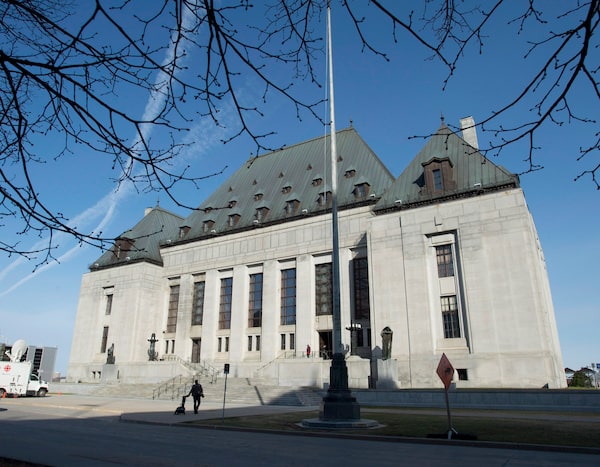
Justices Rosalie Abella, Russell Brown and Sheilah Martin would have set the ceiling at 15 months, saying that young people are harmed more than adults by delay.Adrian Wyld/The Canadian Press
The Supreme Court of Canada says 18-month time limits for adult trials also apply to the youth justice system, but three dissenters said the ruling leaves accused young people worse off than before.
The dissenters – Justice Rosalie Abella, Justice Russell Brown and Justice Sheilah Martin – would have set the ceiling at 15 months, saying that young people are harmed more than adults by delay.
The majority said, however, that young people may seek a trial in less time than 18 months, for special reasons – “for example, if an accused can show that he or she is struggling in school due to anxiety over the outstanding charges” – and might still have their charges dismissed if the prosecution does not take reasonable steps to expedite the matter.
The ruling came in the case of KJM, a 15-year-old boy from Fort McMurray, Alta., accused of using a boxcutter to stab and seriously injure a 16-year-old boy at a house party. It was the first opportunity for the Supreme Court to consider whether the time limits it set in a 2016 case known as Jordan applies to young people. KJM’s criminal proceedings lasted 19 months, from the time he was charged until he was convicted.
Graham Johnson, a lawyer for KJM, had urged the court to set a 12-month limit. He said the majority had shown a “fairly shocking lack of understanding” of Youth Court.
“They’ve essentially said the onus is on the youth, some of the most vulnerable participants in the criminal-justice system, to demonstrate their own vulnerabilities on a case-by-case basis,” he said in an interview with The Globe and Mail. “It’s odd, because it’s enshrined in [the Youth Criminal Justice Act] that youth have a different perception of time and suffer heightened prejudice from delay.”
He said that accused youth tend to be from disadvantaged backgrounds and often have little family support, making it difficult to abide by conditions of release, such as a curfew, which can lead to more trouble with the law.
The court voted 6-3 to extend the adult time limit to youth, and 5-4 to uphold KJM’s conviction (partly because the majority blamed KJM and his lawyer for some of the delay). The Alberta Court of Appeal upheld KJM’s conviction, but of the three appeal judges, one said the adult limits apply, one said they don’t, and one would have shortened them to 15 months.
The three dissenters on the Supreme Court wrote a stinging rebuke to the majority, saying that before the Jordan ruling, courts deemed young people to be entitled to trials in much less than 18 months.
“Applying the adult Jordan ceilings to young persons erodes this standard,” Justice Abella and Justice Brown wrote, supported by Justice Martin. “And it – bizarrely – leaves young persons worse off than they were, since the adult Jordan ceilings potentially allow for more pretrial delay for young persons than the system previously tolerated.” (Emphasized words in the original.) This, said the dissenters, turns the Jordan principles into “a hollow promise” for young people.
The Jordan ruling in the summer of 2016 criticized the criminal-justice system for a “culture of complacency” among all parties, and set time limits of 18 months for proceedings in Provincial Court and 30 months in superior court. It sent shock waves through the system. Within months, two murder charges were thrown out for unreasonable delay. The provinces asked for an emergency meeting with the federal justice minister. In the end, the federal government passed a host of new measures to speed up the system.
Justice Michael Moldaver was a co-author of the Jordan ruling. A decade earlier, while a member of the Ontario Court of Appeal, he had given a speech in which he said he was “mad as hell” about a legal culture that tolerated needless complexity and delay. But in KJM, he said the Jordan ruling had succeeded in creating a faster-moving justice system, and the benefits would be felt in Youth Court. (Justice Brown, a Jordan co-author, split with him on KJM.)
“First and foremost," Justice Moldaver wrote for the majority, “it has not been shown that there is a problem regarding delay in the youth criminal justice system.”
 Sean Fine
Sean Fine